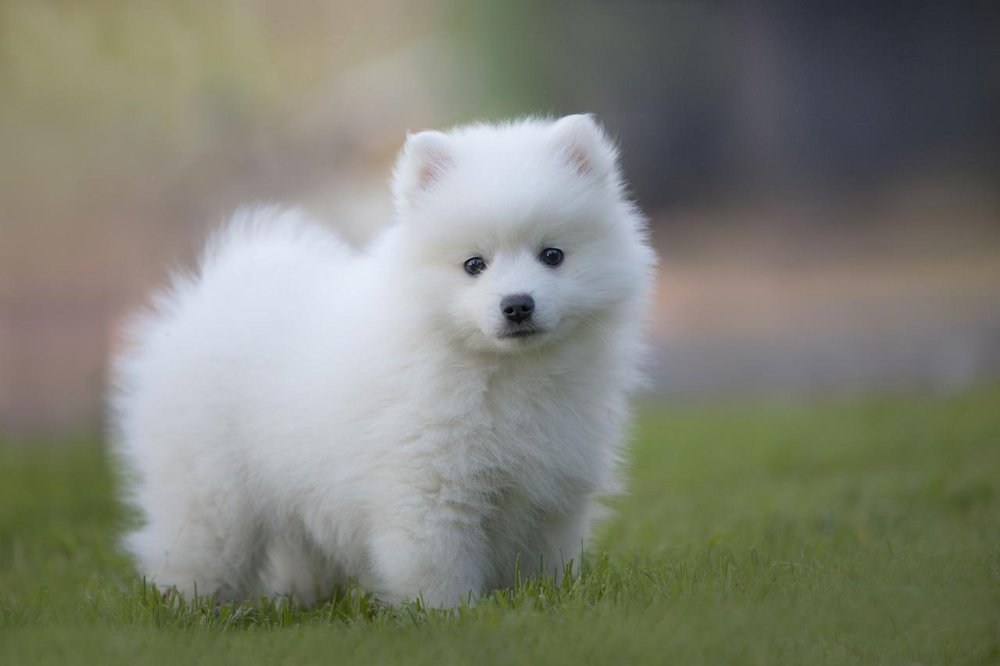- Breed Category: Companion dog
- Country of Origin: Japan
- Average Height: 30-38 cm (11.8-15 in)
- Average Weight: 5-10 kg (11-22 lbs)
- Average Life Span: 12-16 years
- Grooming Requirements: Weekly brushing
- Exercise Requirements: Moderate daily exercise
- Coat Type: Double coat
- Coat Color Variations: Pure white
- Shedding Level: Moderate to high
- Ear Type: Erect ears
- Tail Type: Curled over back
- Temperament: Friendly, alert, loyal
- Intelligence Level: High
- Barking Tendency: Moderate
- Compatibility with Children: Very good
- Compatibility with Other Pets: Generally good
- Training Ease: Relatively easy
- Common Health Issues: Patellar luxation, dental issues
- Dietary Needs: High-quality dog food
- Energy Level: Moderate
- Drooling Tendency: Low
- Sensitivity to Weather: Sensitive to heat
- Overall Maintenance Level: Moderate
- Original Purpose: Companion
- Year of Recognition by Kennel Clubs: 1977
- Apartment Friendly: Yes
- Best Suited For: Families, singles, seniors
- Cost of Ownership: Moderate
- Unique Traits: Smiling expression, fluffy coat
- Cultural Significance: Popular in Japan
- Popularity Rank: Growing in popularity
Think all small white dogs are the same? Let’s talk about the Japanese Spitz. This breed stands out with its fluffy coat and lively personality. Known for their friendly nature and intelligence, Japanese Spitz dogs are a joy to have around. This article will dive into their unique characteristics, rich history, and how to care for them.
The Japanese Spitz has an interesting backstory. Originating in Japan in the early 20th century, they were developed by crossbreeding various Spitz breeds. Their popularity soared post-World War II, thanks to their charming looks and adaptable nature. Today, they’re cherished worldwide for their loyalty and playful spirit. Understanding their history helps appreciate why they make such wonderful companions.
Early Development and Cultural Significance of the Japanese Spitz
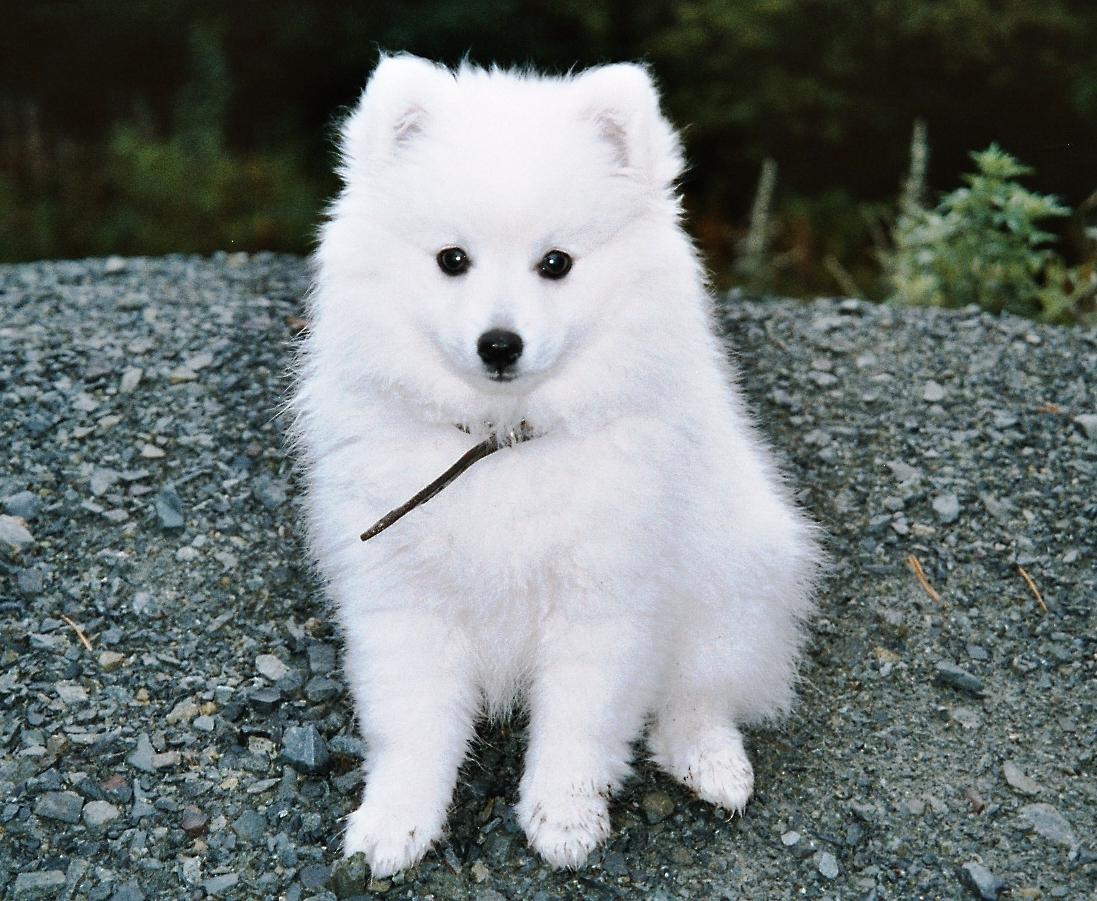
Early Development of the Breed
The Japanese Spitz came into being in the early 20th century, a result of crossbreeding various Spitz breeds. This was a time when Japan was keen on developing a small, friendly companion dog that could thrive in urban settings. The breed’s development was a meticulous process, focusing on creating a dog with a striking appearance and a delightful temperament. By the 1950s, the Japanese Spitz had firmly established itself as a beloved pet in Japan, thanks to its adaptability and charm.
Role in Japanese Culture and Society
In Japan, the Japanese Spitz is more than just a pet; it’s a symbol of companionship and loyalty. These dogs are often seen in family settings, bringing joy and laughter to households. Their friendly nature makes them perfect for families with children, and their intelligence ensures they are easy to train. The breed’s popularity in Japan has also influenced its status worldwide, where it continues to be a cherished family member.
Key Historical Figures and Events
While specific individuals aren’t often highlighted in the breed’s history, the collective efforts of Japanese breeders in the early 20th century were pivotal. These breeders aimed to create a dog that was not only beautiful but also suited to the changing lifestyles of Japanese families. The breed’s recognition by the Japan Kennel Club in the 1940s marked a significant milestone, cementing its status as a distinct and desirable breed.
Physical Characteristics
The Japanese Spitz is known for its stunning white coat, which is both fluffy and dense, giving it a cloud-like appearance. Their dark, almond-shaped eyes and pointed ears add to their alert and intelligent expression. Despite their small size, they have a sturdy build, making them both agile and robust. This combination of beauty and practicality makes the Japanese Spitz a standout among small dog breeds.
Appearance and Unique Traits of the Japanese Spitz

Appearance
The Japanese Spitz is a small to medium-sized dog, typically weighing between 5 to 10 kilograms. Their most striking feature is their fluffy, pure white coat, which is both dense and soft to the touch. This coat gives them a cloud-like appearance, making them look almost ethereal. Their dark, almond-shaped eyes stand out against the white fur, giving them an alert and intelligent expression. Pointed ears add to their keen look, always ready to catch the slightest sound.
Unique Physical Traits
One of the unique traits of the Japanese Spitz is their double coat, which is surprisingly easy to maintain despite its luxurious appearance. The outer coat repels dirt and water, while the undercoat provides insulation. Their tails are another distinctive feature, curling over their backs in a graceful arc. This breed’s compact and sturdy build allows them to be both agile and robust, perfect for active play.
Temperament and Behaviour
Japanese Spitz dogs are known for their friendly and outgoing nature. They thrive on human companionship and are incredibly loyal to their families. These dogs are intelligent and eager to please, making them easy to train. They have a playful spirit and enjoy engaging in activities that challenge their minds. Despite their lively nature, they are also content to relax and enjoy quiet time with their loved ones, making them versatile companions for various lifestyles.
Personality and Suitability as a Family Pet
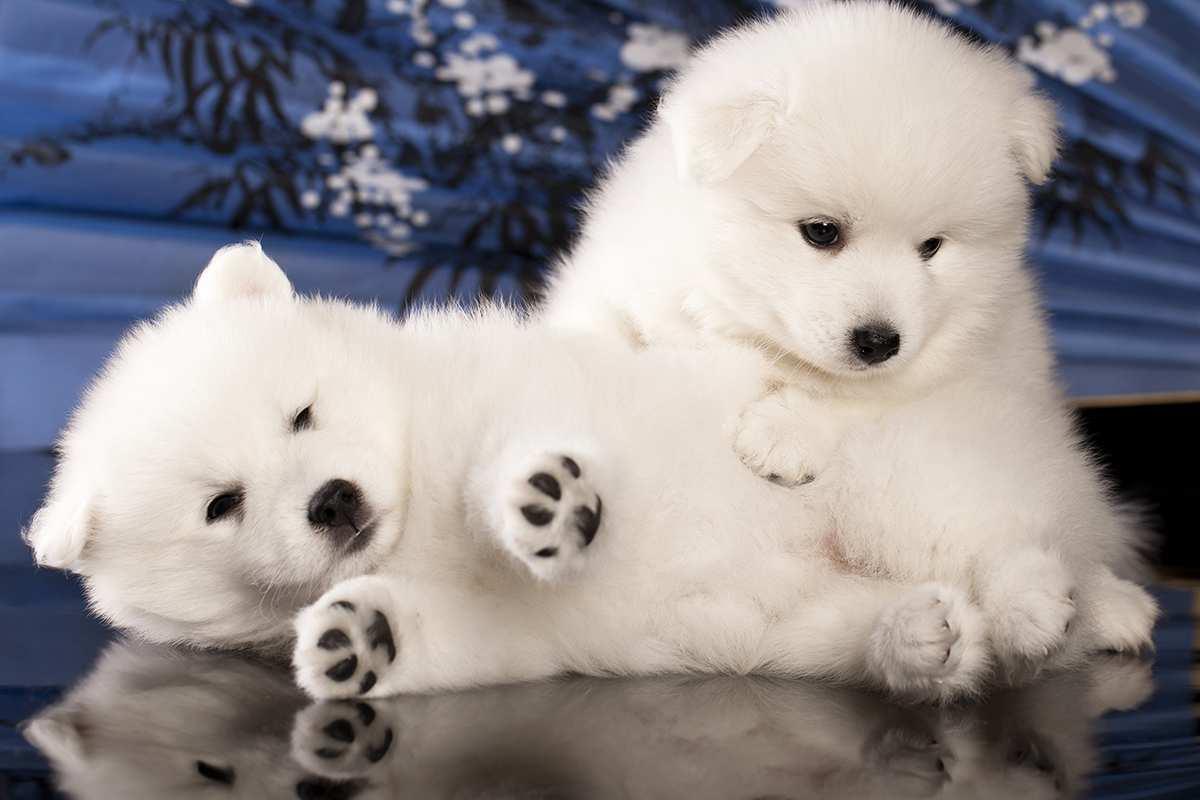
Typical Personality Traits
The Japanese Spitz is a delightful mix of affectionate, playful, and intelligent traits. They love being around people and are known for their friendly and outgoing nature. These dogs are quick learners, which makes them a joy to train. Their playful spirit means they’re always up for a game, but they also know when to settle down and enjoy some quiet time.
Suitability as a Family Pet
As a family pet, the Japanese Spitz is hard to beat. They’re incredibly loyal and form strong bonds with their families. Their adaptable nature means they fit well into various living situations, whether you’re in a bustling city or a quiet suburb. They’re not just pets; they’re companions who bring joy and laughter to any home.
Interaction with Children and Other Animals
Japanese Spitz dogs are great with kids. Their gentle and playful nature makes them perfect playmates for children. They’re patient and tolerant, which is ideal for families with young ones. When it comes to other animals, they’re generally friendly and sociable, getting along well with other pets in the household.
Training and Exercise Needs
Training a Japanese Spitz is usually a breeze due to their intelligence and eagerness to please. They respond well to positive reinforcement and enjoy learning new tricks. Regular exercise is important to keep them happy and healthy. A daily walk and some playtime in the yard or park will keep their energy levels in check.
Training, Exercise, and Health of the Japanese Spitz
Importance of Early Training and Socialisation
Getting a head start on training and socialisation is crucial for the Japanese Spitz. These dogs are naturally intelligent and eager to learn, so introducing them to different environments, people, and other animals early on helps them grow into well-rounded adults. A well-socialised Spitz is confident and less likely to develop behavioural issues.
Recommended Training Techniques
Positive reinforcement is the way to go with these clever canines. They respond well to treats, praise, and play as rewards. Consistency is key, so keep training sessions short and fun to maintain their interest. Teaching basic commands and tricks can be a rewarding experience for both you and your dog.
Daily Exercise Requirements and Activities They Enjoy
Japanese Spitz dogs are active and need regular exercise to stay happy. A daily walk, combined with some playtime in the backyard or park, will do wonders for their physical and mental health. They love games like fetch and agility exercises, which also provide a great opportunity for bonding.
Health and Lifespan
Generally healthy, the Japanese Spitz can live up to 14 years with proper care. Regular vet check-ups, a balanced diet, and maintaining a healthy weight are essential for their well-being. While they are a robust breed, keeping an eye on their dental health and grooming needs will ensure they stay in top shape.
Health and Care of the Japanese Spitz

Common Health Issues
Japanese Spitz dogs are generally healthy, but like any breed, they can be prone to certain health issues. Patellar luxation, where the kneecap dislocates, is one concern. They might also face dental problems, so regular teeth cleaning is a must. Keeping an eye on their health and visiting the vet regularly can help catch any issues early.
Average Lifespan and Health Tips
With proper care, a Japanese Spitz can live up to 14 years. To keep them healthy, ensure they have a balanced diet and regular exercise. Maintaining a healthy weight is crucial, as obesity can lead to other health problems. Regular vet check-ups are essential to monitor their overall health and catch any potential issues early.
Preventative Care Recommendations
- Regular vet visits for vaccinations and health checks.
- Consistent dental care to prevent gum disease.
- Maintain a balanced diet and exercise routine.
- Grooming to keep their coat clean and free of mats.
Grooming and Maintenance
Their fluffy white coat might look high-maintenance, but it’s surprisingly easy to care for. Regular brushing, about twice a week, helps keep their coat clean and reduces shedding. Bathing them occasionally, when they get particularly dirty, is enough. Their nails should be trimmed regularly, and their ears checked for any signs of infection.
Coat Care and Grooming Routines
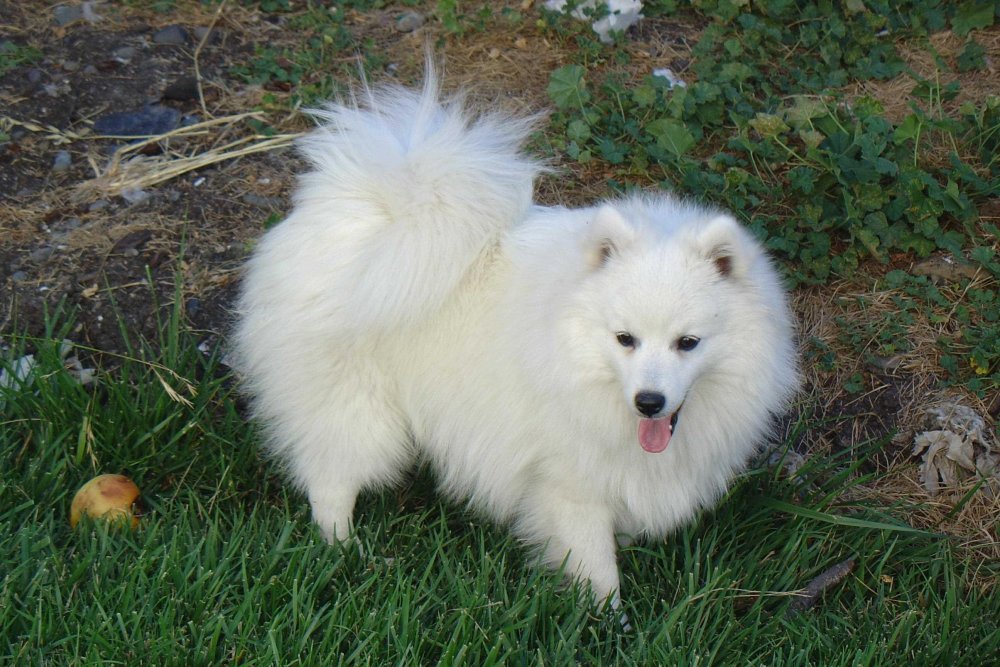
Shedding and Seasonal Grooming Tips
The Japanese Spitz’s coat is a marvel, but it does require some attention. They shed moderately throughout the year, with a heavier shed during spring and autumn. Regular brushing, about twice a week, helps manage this and keeps their coat looking pristine. During shedding seasons, you might want to brush them more frequently to keep loose hair under control. A slicker brush or a comb designed for double coats works wonders.
Diet and Nutrition
Feeding your Japanese Spitz a balanced diet is key to their health and vitality. High-quality dog food, rich in protein and essential nutrients, supports their active lifestyle and maintains their beautiful coat. Be mindful of portion sizes to prevent obesity, which can lead to other health issues. Fresh water should always be available, and occasional treats can be a great training aid, but moderation is crucial. Regular vet consultations can help tailor their diet to specific needs, ensuring they thrive.
Nutritional Needs and Feeding Guidelines for the Japanese Spitz

Nutritional Needs for Optimal Health
To keep your Japanese Spitz in top shape, focus on a diet rich in high-quality proteins and essential nutrients. These dogs are active and need a balanced diet to support their energy levels and maintain their stunning coat. Look for dog food that lists meat as the first ingredient and includes healthy fats and carbohydrates.
Foods to Include and Avoid
Include lean meats, fish, and vegetables in their diet. Foods rich in omega-3 fatty acids, like fish oil, can enhance their coat’s shine. Avoid foods with artificial additives, excessive fillers, and high-fat content, as these can lead to obesity and other health issues.
Feeding Schedules and Portion Recommendations
Feed your Japanese Spitz twice a day, once in the morning and once in the evening. Portion sizes depend on their age, weight, and activity level, so consult your vet for personalised advice. Overfeeding can lead to weight gain, so keep an eye on their body condition.
Fun Facts and Trivia
Did you know the Japanese Spitz is often mistaken for the American Eskimo Dog due to their similar appearance? Despite their fluffy coat, they are surprisingly low-maintenance when it comes to grooming. Their coat is dirt-repellent, making them easier to keep clean than you might think!
Interesting Tidbits and Famous Japanese Spitz Dogs
Interesting Tidbits about the Breed
The Japanese Spitz is often mistaken for other small white breeds, but they have their own unique charm. One fascinating aspect is their coat, which is not only beautiful but also practical. It’s dirt-repellent, meaning these dogs stay cleaner than you might expect. Despite their fluffy appearance, they’re surprisingly low-maintenance when it comes to grooming. Another interesting fact is their vocal nature; they’re known to be quite alert and will let you know if something’s amiss, making them excellent watchdogs.
Famous Japanese Spitz Dogs in Media or History
While the Japanese Spitz may not have the same level of fame as some other breeds, they’ve made their mark in various ways. In Japan, they’ve been featured in commercials and TV shows, often portraying the ideal family pet due to their friendly and photogenic nature. Their popularity in media has helped boost their status as a beloved companion worldwide. Although not as widely recognised as some celebrity dogs, their charm and charisma have certainly earned them a special place in the hearts of many dog lovers.
Final Thoughts
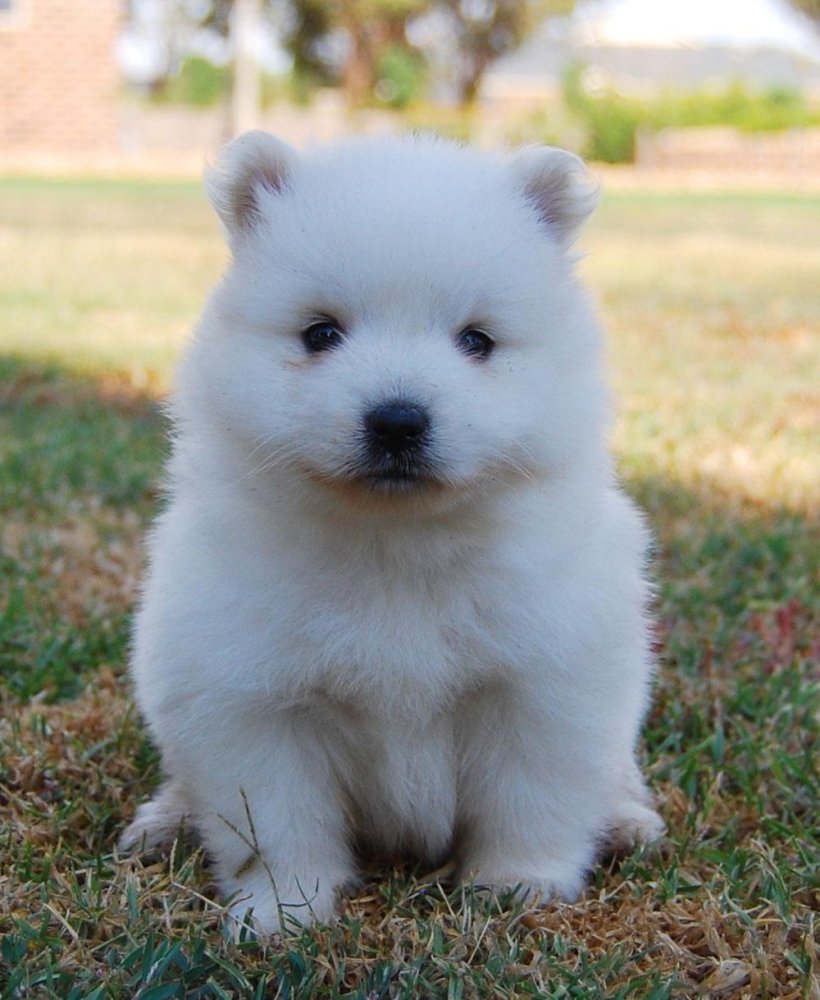
The Japanese Spitz is a delightful companion breed. With their friendly nature and intelligence, they bring joy to any household. Their adaptability and loyalty make them ideal for families, singles, and seniors alike. Embracing their unique traits and understanding their needs ensures a rewarding relationship with these charming dogs. Consider welcoming a Japanese Spitz into your home and experience the joy they bring firsthand.
